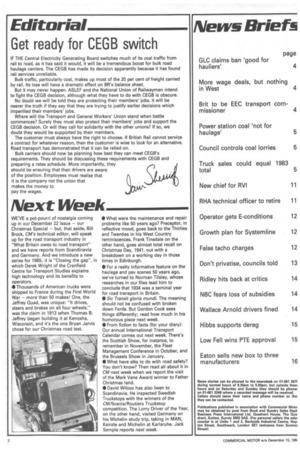Get ready for CEGB switch
Page 4

If you've noticed an error in this article please click here to report it so we can fix it.
IF THE Central Electricity Generating Board switches much of its coal traffic from rail to road, as it has said it would, it will be a tremendous boost for bulk road haulage carriers. The CEGB has made its decision apparently because it has found rail services unreliable.
Bulk traffic, particularly coal, makes up most of the 20 per cent of freight carried by rail. Its loss will have a dramatic effect on BR's balance sheet.
But it may never happen. ASLEF and the National Union of Railwaymen intend to fight the CEGB decision, although what they have to do with CEGB is obscure.
No doubt we will be told they are protecting their members' jobs. It will be nearer the truth if they say that they are trying to justify earlier decisions which imperilled their members' jobs.
Where will the Transport and General Workers' Union stand when battle commences? Surely they must also protect their members' jobs and support the CEGB decision. Or will they call for solidarity with the other unions? If so, we doubt they would be supported by their members.
The customer must always have the right to choose. If British Rail cannot service a contract for whatever reason, then the customer is wise to look for an alternative. Road transport has demonstrated that it can be relied on.
Bulk carriers should now be planning how best they can meet CEGB's requirements. They should be discussing these requirements with CEGB and preparing a rates schedule. More importantly, they should be ensuring that their drivers are aware of the position. Employees must realise that it is the company not the union that makes the money to pay the wages.












































































